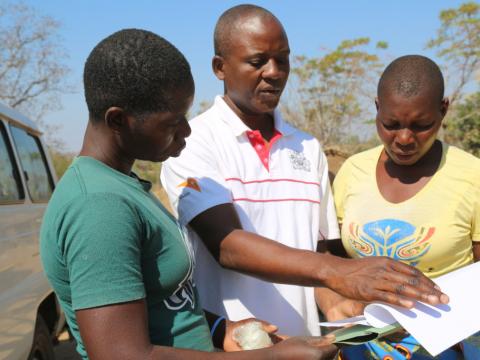Implementation Quality Assurance (IQA) Tools

IQA: Essential Elements for Health and Nutrition Project Models
Introduction
Project models are intended to be developed based on evidence of positive impact on specific outcomes. In the process of demonstrating evidence, strict controls are typically enforced on implementation procedure. As good models are scaled up, however, these controls often disappear, and implementation procedures are degraded. This might almost be considered a natural effect as models are “communicated” from their original test sites to multiple implementation contexts. Dilution of implementation integrity is not uncommon through cascading training cycles, and magnified when implementers have little related technical experience.
To address the somewhat natural degradation of project model implementation World Vision has developed sets of essential elements for our project models. The objective of this effort is to encourage the quality of intervention implementation per best practice recommendations so as to increase probability of positive impact. Essential elements describe intended programme design and implementation elements of an evidence-based project model. The implementation quality assurance (IQA) tools help to assess whether the essential elements have been applied.
What are the IQA tools?
The IQA tools are a set of qualitative self-assessment tools to determine programme fidelity to essential elements of core health and nutrition project models. The primary target users are implementers and those directly involved in the programme, including partners. Secondary users may include national office senior level staff or supervisory staff/decision-makers for technical programming as well as project model experts and visiting staff familiar with the project model.
The IQA tools were developed for the following models:
- Community Health Workers (see also Timed and Targeted Counselling (TTC) and Nurturing Care Group Models)
- Community Case Management (CCM)
- Community Health Worker (CHW)
- Channels of Hope (COH)
- Community-based Management of Acute Malnutrition (CMAM)
- Positive Deviance Hearth (PDH)
- Community Committees (COMM)
- Citizens’ Voice and Action (CVA)
Each project model has its own set of IQA tools for both the design and implementation phase of programming. (CVA is an exception with a single IQA to encompass its design and implementation phase.)
When should the IQA be performed?
During programme design
The IQA should be used to inform design teams on essential elements to be planned for.
During implementation
The IQA can be used by any supervisory or visiting staff. They can be used to frame qualitative inquiry with implementation staff and managers, and rated according to the assessment scores. Subsequently, recommended actions for improvement can be made. They can also be used as a self-assessment tool to be completed by implementers during the project cycle. The assessment of the elements represents a rapid appraisal methodology.
During stakeholder orientation
The IQA represent a convenient outline for stakeholder orientation, quickly conveying the essential elements of the model. For example, National Office senior leaders, or Support Programme Officers might quickly assimilate the qualitative requirements of model implementation through review of the elements.
During government and NGO partner harmonisation
The IQA can also be shared with district and national authorities and facilitate quality standards among NGOs in cross partner harmonisation and multi-stakeholder frameworks.
What should the IQA not be used for?
- The elements within the IQA should not be taken as an ‘upper limit’ for efforts to deliver on a project; they are deliberately set at a minimum level in order to apply globally.
- The IQA tools are not comprehensive enough to be applied for programme evaluation purposes, but may serve as a starting point for more comprehensive tool development.
- Elements within the IQA should not inhibit innovation, where innovation has been well evaluated and found to be effective. Emerging good practices and creative approaches within contexts should be shared and achievements recognised.
- The elements within the IQA are not intended as a compliance mechanism. Their use is for quality assurance, learning, and improvement.
Format of IQA tools
The IQA tools consist of a printable word document form for easy use during assessment and Excel database calculator form for data collection purposes. The format of the IQA tools functions like a checklist to assess what components of essential elements are present in the programme. It also has a table to record any variances as well as data source(s) of each essential element and space for documenting valuable insights from the assessment and actions planned. With the Excel database calculator, the IQA score is automatically calculated for the programme. Thus, it is not necessary to focus on the IQA scoring as during the assessment process, but on the strengths and gaps in implementation of the project model. Once the assessment is complete, the data can be transferred to the Excel database form to generate the necessary scores for IQA.
IQA Scores
In the Excel database form, each element will be given a score according to the number of components fulfilled. The IQA score for each element will be out of two (see table below for descriptions of each score). The overall IQA score for the design and implementation phase is derived by the average of individual element scores.
IQA Toolkit Links
IQA Toolkits for each project model have been zipped and linked below. You will also find links to these toolkits on each of the related project model pages (under the Best Practices menu).
- Timed and Targeted Counselling IQA,
- Community Case Management IQA,
- Community Health Worker IQA,
- Channels of Hope IQA,
- Community-based Management of Acute Malnutrition IQA,
- Positive Deviance Hearth IQA,
- Community Committees IQA, and
- Citizens’ Voice and Action IQA.
Have questions about IQA? Contact Carmen Tse - Health@wvi.org